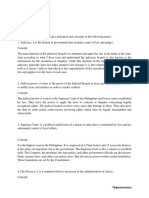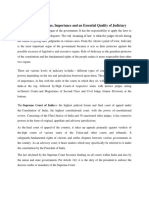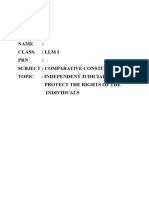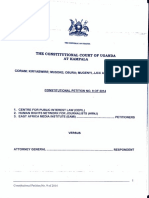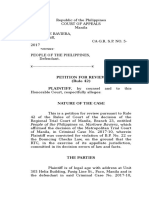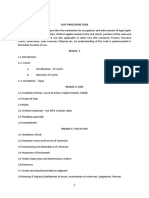0 ratings0% found this document useful (0 votes)
4 viewsSUPREME
SUPREME
Uploaded by
Esther AnandThe Supreme Court is the highest judicial body in many legal systems and its primary functions are to interpret laws including the constitution, ensure consistent interpretation of laws, hear appeals, safeguard rights and liberties, resolve disputes between states, provide advisory opinions in some jurisdictions, nominate and confirm judges, and symbolize judicial independence.
Copyright:
© All Rights Reserved
Available Formats
Download as PDF, TXT or read online from Scribd
SUPREME
SUPREME
Uploaded by
Esther Anand0 ratings0% found this document useful (0 votes)
4 views1 pageThe Supreme Court is the highest judicial body in many legal systems and its primary functions are to interpret laws including the constitution, ensure consistent interpretation of laws, hear appeals, safeguard rights and liberties, resolve disputes between states, provide advisory opinions in some jurisdictions, nominate and confirm judges, and symbolize judicial independence.
Copyright
© © All Rights Reserved
Available Formats
PDF, TXT or read online from Scribd
Share this document
Did you find this document useful?
Is this content inappropriate?
The Supreme Court is the highest judicial body in many legal systems and its primary functions are to interpret laws including the constitution, ensure consistent interpretation of laws, hear appeals, safeguard rights and liberties, resolve disputes between states, provide advisory opinions in some jurisdictions, nominate and confirm judges, and symbolize judicial independence.
Copyright:
© All Rights Reserved
Available Formats
Download as PDF, TXT or read online from Scribd
Download as pdf or txt
0 ratings0% found this document useful (0 votes)
4 views1 pageSUPREME
SUPREME
Uploaded by
Esther AnandThe Supreme Court is the highest judicial body in many legal systems and its primary functions are to interpret laws including the constitution, ensure consistent interpretation of laws, hear appeals, safeguard rights and liberties, resolve disputes between states, provide advisory opinions in some jurisdictions, nominate and confirm judges, and symbolize judicial independence.
Copyright:
© All Rights Reserved
Available Formats
Download as PDF, TXT or read online from Scribd
Download as pdf or txt
You are on page 1of 1
The Supreme Court is the highest judicial body in many legal systems around the world.
Its
primary function is to interpret and apply the law, including constitutional law, and to ensure
consistency and uniformity in the interpretation of laws within the jurisdiction.
Here are some key aspects and functions of the Supreme Court:
1. Interpretation of the Constitution: One of the most important functions of the
Supreme Court is to interpret the constitution of the country. It determines the
constitutionality of laws, regulations, and government actions, ensuring that they
comply with the provisions of the constitution. Through the process of judicial
review, the Supreme Court can strike down laws that are found to be unconstitutional.
2. Final Appellate Jurisdiction: In many legal systems, the Supreme Court serves as
the court of last resort. It hears appeals from lower courts on matters of law, ensuring
consistency in the application of legal principles and resolving disputes that have
significant legal implications. The decisions of the Supreme Court set precedents that
lower courts must follow in similar cases.
3. Guardian of Rights and Liberties: The Supreme Court plays a crucial role in
safeguarding individual rights and liberties. It adjudicates cases involving civil
liberties, such as freedom of speech, religion, and privacy, and ensures that these
rights are protected from government infringement. The Supreme Court's decisions
often shape the legal landscape and influence public policy on matters of fundamental
rights.
4. Resolution of Disputes Between States (if applicable): In federal systems of
government, such as the United States, the Supreme Court may have jurisdiction over
disputes between states or between the federal government and the states. It resolves
conflicts arising from differences in interpretation of federal and state laws or
conflicts over jurisdictional issues.
5. Advisory Opinions (in some jurisdictions): In certain legal systems, the Supreme
Court may provide advisory opinions to the executive or legislative branches on
matters of constitutional interpretation or legal questions of public importance. While
advisory opinions are not binding, they may carry significant persuasive authority.
6. Nomination and Confirmation of Judges: In some countries, the Supreme Court is
responsible for nominating and confirming judicial appointments to lower courts. The
appointment process may involve consultation with other branches of government or
independent judicial nominating commissions to ensure the selection of qualified and
impartial judges.
7. Symbol of Judicial Independence: The Supreme Court is often viewed as a symbol
of judicial independence and impartiality. Justices are typically appointed for life or
long terms to insulate them from political influence and ensure that they can render
decisions based on the law and the merits of the case, rather than political
considerations.
Overall, the Supreme Court plays a vital role in upholding the rule of law, protecting
individual rights, and ensuring the proper functioning of the legal system. Its decisions have
far-reaching consequences and contribute to the development and evolution of legal
principles and jurisprudence
You might also like
- Chapter 06: Judiciary Any 1 Question Out of 4 Likely To Come in ExamDocument4 pagesChapter 06: Judiciary Any 1 Question Out of 4 Likely To Come in ExamAqib ShaikhNo ratings yet
- Lesson 10 Functions of The Judicial BranchDocument4 pagesLesson 10 Functions of The Judicial BranchJeff LacasandileNo ratings yet
- Judicial ProcessDocument13 pagesJudicial Processpsolution732No ratings yet
- Lowi 2017 CH 9Document42 pagesLowi 2017 CH 9JosefinaGomezNo ratings yet
- Q. Discuss The Features of US Constitution. Ans-Introduction: - The United States Constitution Stands As The Cornerstone ofDocument9 pagesQ. Discuss The Features of US Constitution. Ans-Introduction: - The United States Constitution Stands As The Cornerstone ofdasrajpratim24No ratings yet
- Worksheet at Kumonikasyon.Document38 pagesWorksheet at Kumonikasyon.Neil Aldrene DelaluyaNo ratings yet
- Sources of Nepalese SystemDocument14 pagesSources of Nepalese SystemmadhavNo ratings yet
- Group Nine Presentation Legal System and MethodsDocument20 pagesGroup Nine Presentation Legal System and MethodsmigasiakimberlyNo ratings yet
- Judicial Process Notes 2Document38 pagesJudicial Process Notes 2psolution732No ratings yet
- Judicial Review in Indi1Document10 pagesJudicial Review in Indi1chavan.sandeep191189No ratings yet
- JurisprudenceDocument21 pagesJurisprudencemiintlyricsNo ratings yet
- A Judicial System in Goa - Gaurav & GaiyatriDocument17 pagesA Judicial System in Goa - Gaurav & GaiyatriGaiyatri UmraskarNo ratings yet
- Legislature: Meaning, Functions and Types of LegislatureDocument8 pagesLegislature: Meaning, Functions and Types of LegislatureHasan MuhtadyNo ratings yet
- American Government - Power and Purpose (Lowi) Chapter 9 The U.S. Judiciary (Selected Material)Document27 pagesAmerican Government - Power and Purpose (Lowi) Chapter 9 The U.S. Judiciary (Selected Material)MicaEscoNo ratings yet
- Introduction To Indian JudiciaryDocument10 pagesIntroduction To Indian JudiciarytrymepuliNo ratings yet
- LLB 10Document21 pagesLLB 10shubsNo ratings yet
- Solved Paper of Jurisprudence 2Document47 pagesSolved Paper of Jurisprudence 2Tulja RamNo ratings yet
- Chapter 18Document5 pagesChapter 18wildngl554No ratings yet
- UNIT -3 COIDocument15 pagesUNIT -3 COIrashmi.ricchariyaNo ratings yet
- Functions of Judiciary and Quasi-JudiciaryDocument2 pagesFunctions of Judiciary and Quasi-Judiciaryera_sharma06No ratings yet
- Legal Studies Ch-1 Judiciary XIIDocument25 pagesLegal Studies Ch-1 Judiciary XIIsarthak49620No ratings yet
- Constitutional Law NotesDocument16 pagesConstitutional Law NotesAlister KNo ratings yet
- JudiciaryDocument16 pagesJudiciarysd2261377No ratings yet
- Legislation Notes: Judiciary:: 1. To Give Justice To The PeopleDocument8 pagesLegislation Notes: Judiciary:: 1. To Give Justice To The Peoplesimran yadavNo ratings yet
- Legal Methods 2Document13 pagesLegal Methods 2Yashasvi SinghNo ratings yet
- Introduction To LawDocument82 pagesIntroduction To Lawashadkhan1000No ratings yet
- Introduction To Legal ResearchDocument13 pagesIntroduction To Legal ResearchCharm BruanNo ratings yet
- The Judiciary of Pakistan Is A Hierarchical System With Two Classes of CourtsDocument3 pagesThe Judiciary of Pakistan Is A Hierarchical System With Two Classes of CourtsMueed AbidNo ratings yet
- JudiciaryDocument10 pagesJudiciaryAnantha KrishnaNo ratings yet
- MODULE of Business LawDocument38 pagesMODULE of Business Lawrajurastogi00710No ratings yet
- Definition of Law, Court and JudgeDocument2 pagesDefinition of Law, Court and JudgeIman DasNo ratings yet
- Role of JudiciaryDocument1 pageRole of JudiciaryShefali SuriNo ratings yet
- Chapter - IV Judicial System in India and Judicial ActivismDocument59 pagesChapter - IV Judicial System in India and Judicial Activismaurobinda nayakNo ratings yet
- Judicial Process and Constitution Final Exam NotesDocument50 pagesJudicial Process and Constitution Final Exam NotesfruitfulscionNo ratings yet
- Title The Connection Between Legislation and Judicial Rulings 1Document7 pagesTitle The Connection Between Legislation and Judicial Rulings 1hasanuzzamanshohag396No ratings yet
- Independent Judiciary Can Protect The Rights of The IndividualsDocument13 pagesIndependent Judiciary Can Protect The Rights of The Individualssurajalure44No ratings yet
- Sources of LawDocument4 pagesSources of LawSiddhant SodhiaNo ratings yet
- Facilitated By: Vida Ampiah (MS.) : The JudiciaryDocument15 pagesFacilitated By: Vida Ampiah (MS.) : The JudiciaryEbenezer GyamfiNo ratings yet
- Sources of LawDocument3 pagesSources of Lawjashshah08990No ratings yet
- Patterson10 SG Ch14Document16 pagesPatterson10 SG Ch14Kristin DikiciyanNo ratings yet
- Appendix 1: 3 Judicial Ethics in South AfricaDocument14 pagesAppendix 1: 3 Judicial Ethics in South AfricaBruce MaguranyangaNo ratings yet
- Unit 3Document20 pagesUnit 3Gurnimratjeet KaurNo ratings yet
- Judicisl Process 1Document9 pagesJudicisl Process 1zoma itrat khanNo ratings yet
- 1.2 Judicial Process and Creativity in LawDocument4 pages1.2 Judicial Process and Creativity in Lawsuryanarayandas1994No ratings yet
- Legal Studies Prelim Yearly NotesDocument20 pagesLegal Studies Prelim Yearly NotesAqua Dreamweaver Tutorials100% (3)
- Functions of The JudiciaryDocument4 pagesFunctions of The JudiciarySrini VaSNo ratings yet
- Tugas Hukum BisnisDocument6 pagesTugas Hukum Bisnisfifi musfiraNo ratings yet
- Tom Ginsburg Judicial AppointmentsDocument10 pagesTom Ginsburg Judicial AppointmentssenseiiramaNo ratings yet
- Walsh - 301 Admin - Midterm 2010Document40 pagesWalsh - 301 Admin - Midterm 2010Sunny GrewalNo ratings yet
- Judicial Precedent Is A Source of LawDocument5 pagesJudicial Precedent Is A Source of LawMohit MalhotraNo ratings yet
- Independence of Judiciary in India: International Journal of LawDocument3 pagesIndependence of Judiciary in India: International Journal of LawNitin GuptaNo ratings yet
- JudiciaryDocument2 pagesJudiciaryAnitha ReddyNo ratings yet
- Role of Judiciary in IndiaDocument12 pagesRole of Judiciary in Indiaarunmittal1985No ratings yet
- Political Science SEM 3Document9 pagesPolitical Science SEM 3bane.yashraj2509No ratings yet
- JudiciaryDocument4 pagesJudiciaryShazedul Haque 1931727630No ratings yet
- Legal ResearchDocument52 pagesLegal ResearchKarla EspinosaNo ratings yet
- Basics of Case LawDocument18 pagesBasics of Case LawAlaina FatimaNo ratings yet
- Legal StudiesDocument2 pagesLegal Studieszoya last nameNo ratings yet
- Judicial Process in IndiaDocument47 pagesJudicial Process in Indiakarthiks100% (1)
- Gale Researcher Guide for: Overview of US Court System and StructureFrom EverandGale Researcher Guide for: Overview of US Court System and StructureNo ratings yet
- Rufino v. EndrigaDocument32 pagesRufino v. EndrigajoshmagiNo ratings yet
- Constitutional Court Dismisses Suit Challenging Press and Journalists' ActDocument30 pagesConstitutional Court Dismisses Suit Challenging Press and Journalists' ActAfrican Centre for Media ExcellenceNo ratings yet
- Digest Tañada vs. Tuvera (No. L-63915)Document3 pagesDigest Tañada vs. Tuvera (No. L-63915)m100% (2)
- Before The Madurai Bench of Madras High Court: W.P (MD) .No.12015 of 2021Document34 pagesBefore The Madurai Bench of Madras High Court: W.P (MD) .No.12015 of 2021Shubhra AgarwalNo ratings yet
- Juris Exam QuestionsDocument7 pagesJuris Exam QuestionsKen AggabaoNo ratings yet
- David Canter v. The American and Ocean Insurance Company of New York, 27 U.S. 554 (1829)Document2 pagesDavid Canter v. The American and Ocean Insurance Company of New York, 27 U.S. 554 (1829)Scribd Government DocsNo ratings yet
- Petitioner: First DivisionDocument8 pagesPetitioner: First DivisionHannah SyNo ratings yet
- Ramah V LatonDocument2 pagesRamah V LatonBudaxKechikNo ratings yet
- Ma Political Science Books in UrduDocument2 pagesMa Political Science Books in UrduNadir Khan0% (1)
- Petition For Review Under Rule 42Document10 pagesPetition For Review Under Rule 42apbuera100% (4)
- Nkhoma V NkhomaDocument6 pagesNkhoma V NkhomaIsaiah SilungweNo ratings yet
- US Vs DorrDocument7 pagesUS Vs DorrMary Christine Cesara DaepNo ratings yet
- Narottam and Parekh Ltd. Vs Commissioner of Income-Tax, ... On 6 March, 1953Document5 pagesNarottam and Parekh Ltd. Vs Commissioner of Income-Tax, ... On 6 March, 1953RUDRAKANT PANDEYNo ratings yet
- Article 371F in The Constitution of India 1949Document2 pagesArticle 371F in The Constitution of India 1949Tage NobinNo ratings yet
- G O (P) No 819Document4 pagesG O (P) No 819yaswanthreddy_05100% (2)
- AP US Government Study Guide: Unit 1Document41 pagesAP US Government Study Guide: Unit 1rachel agnewNo ratings yet
- Manila Prince Hotel vs. GSIS - DigestDocument2 pagesManila Prince Hotel vs. GSIS - DigestSyd Geemson ParrenasNo ratings yet
- 1.cuenco vs. Court of Appeals DigestDocument3 pages1.cuenco vs. Court of Appeals DigestCaroline A. LegaspinoNo ratings yet
- CPC Course Outline Yuvraj ParekhDocument3 pagesCPC Course Outline Yuvraj ParekhShashwat DroliaNo ratings yet
- Motion For Destruction - Buy Bust OpnDocument2 pagesMotion For Destruction - Buy Bust OpnDolores PulisNo ratings yet
- Detail Judgment Released by Supreme Court of Pakistan Disqualifying Prime Minister of PakistanDocument99 pagesDetail Judgment Released by Supreme Court of Pakistan Disqualifying Prime Minister of PakistanMYOB420No ratings yet
- Salvador Jr. Villareal, A092 722 540 (BIA March 17, 2011)Document6 pagesSalvador Jr. Villareal, A092 722 540 (BIA March 17, 2011)Immigrant & Refugee Appellate Center, LLC100% (1)
- Intermediate Legislative Branch HandoutsDocument6 pagesIntermediate Legislative Branch HandoutsHD TvNo ratings yet
- State - Article 12Document28 pagesState - Article 12Harshil ShahNo ratings yet
- Types of WritsDocument19 pagesTypes of WritsGaurav TripathiNo ratings yet
- House of LordsDocument5 pagesHouse of LordsChristine SalimoNo ratings yet
- 20190507-G. H. Schorel-Hlavka O.W.B. To Australian Electoral Commission Re COMPLAINTSDocument19 pages20190507-G. H. Schorel-Hlavka O.W.B. To Australian Electoral Commission Re COMPLAINTSGerrit Hendrik Schorel-HlavkaNo ratings yet
- Case 15 - Lozano vs. Nograles (GR No. 187883)Document3 pagesCase 15 - Lozano vs. Nograles (GR No. 187883)09367766284No ratings yet
- Legal Opinion On The Supreme Court'S Decision in The Case of Maynilad Water ServicesDocument2 pagesLegal Opinion On The Supreme Court'S Decision in The Case of Maynilad Water ServicesIvy Joyce De PedroNo ratings yet
- Case Digest de Agbayani Vs PNBDocument2 pagesCase Digest de Agbayani Vs PNBSuho Kim100% (2)





